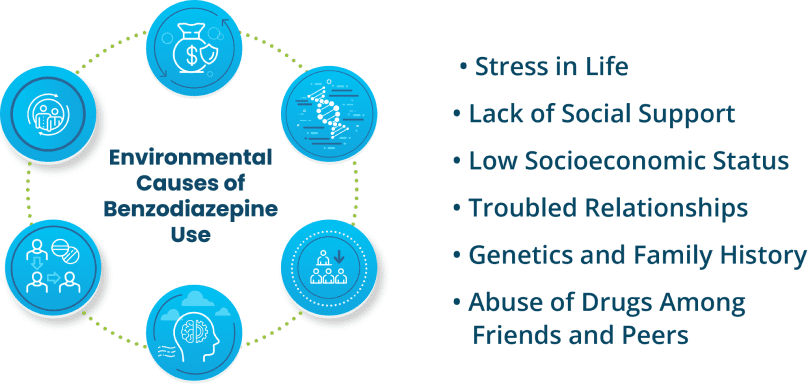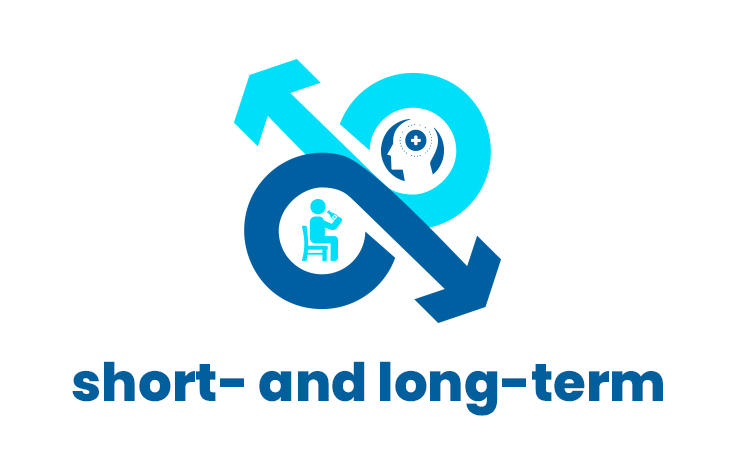Benzodiazepine Addiction: Effects and Treatment
In the United States, benzodiazepines (benzos) are one of the most commonly prescribed medications. In 2017, over 120 million benzodiazepine prescriptions were filled in the US. Benzos are sedative-hypnotic drugs often used to treat anxiety disorder, panic disorder, muscle spasms, certain seizure disorders, and sleep disorders in rare situations. Unfortunately, benzodiazepine abuse is also a major issue in the country.
Tolerance and physiological dependency on benzodiazepines may develop with chronic usage. As a result, users may feel compelled to take more benzos to get the desired effect and then continue taking them to prevent withdrawal symptoms. Although these are not only contributing factors, both of these phenomena can contribute to long-term, compulsive usage or benzodiazepine addiction.
Treatment Services
It is recommended that anybody suffering from benzodiazepine addiction get professional help. However, this might be difficult since individuals are unsure of what to look for. Not every treatment center is the same, and treatment programs might differ from one to the next. To guarantee an effective treatment program, the chosen rehab facility should provide a comprehensive continuum of care and provide patients with a wide selection of treatment options. Among these treatment services include:
- Medical evaluation and diagnosis
- Building a personalized treatment plan
- Medical detox and withdrawal management
- Inpatient and outpatient rehab
- Aftercare or sober living
- Alternative therapy methods
- Individual therapy sessions, group therapy sessions, or family therapy sessions
Finding a medical detox center is the safest approach to continue the treatment process because benzodiazepine withdrawal symptoms can be severe. Trying an at-home or rapid detox method may result in relapse due to cravings during detox and in the weeks following.

Symptoms of Benzodiazepine Addiction
In the early stages of usage, benzos can be quite useful, particularly in treating symptoms of insomnia. When benzodiazepines are taken for longer periods of time or at higher doses, they can become very addictive.
Before addiction takes hold, a person will develop tolerance to benzos. This implies they begin taking a higher dose than was initially prescribed in order to achieve the same benefit with a lower dose.
Tolerance can progress to dependency when a person begins to rely on benzodiazepine because they experience physical and psychological disturbances without it.
Following are some of the common physical, psychological, and behavioral symptoms of benzodiazepine addiction:
- Engaging in risk-taking behaviors, such as driving after abusing benzodiazepines
- Mixing benzodiazepines with other addictive drugs, such as alcohol
- Doctor shopping
- Mood swings
- Weakness
- Asking family members, friends, or co-workers for their benzodiazepine pills
- Wanting to quit using but not being able to do so
- Poor judgment
- Blurry vision
- Seizures
- Drowsiness
Approximately 8.6 percent of the American population needs treatment for drug or alcohol abuse. However, only a small number of these people actually receive treatment. Whether it’s due to shame, the assumption that their substance use isn’t “that bad,” or any other reason, many people put off seeking professional treatment until their addiction has significantly impacted their lives.
Consider the following signs if you are in a place where you think you may need treatment but are unsure. This list may motivate you to see a counselor sooner rather than later.
- Causing harm to yourself and others as a result of substance use
- Unable to quit on your own
- Your addiction is the core of serious consequences (e,g. poor performance at work/school, relationship issues, financial issues, dodging responsibilities, etc.)
- Life revolves around addiction
Bravely recognizing an addiction problem is challenging but can help you achieve freedom with the right tools and treatment. To begin your recovery journey today, contact The Haven Detox at (561) 328-8627.
It might be difficult to assist a loved one who is suffering from benzo addiction. You cannot contact a person’s substance usage, nor can you force them to do anything. You may, however, express your concerns and provide your support, such as offering to accompany them to a treatment assessment or encourage them to join a self-help meeting such as Narcotics Anonymous (NA).
If your loved one is hesitant or afraid that treatment will not be effective, assure them that rehabilitation treatment to help individuals quit works and that benzodiazepine use disorder can be effectively managed. It is important to underline that treatment is required to restore brain function impairment caused by repetitive benzo abuse.
It is also important to bear in mind that interventions do not always work. That’s why it is crucial to seek help from medical professionals at The Haven Detox. Contact us at (561) 328-8627!

Causes of Benzodiazepine Addiction
Even though benzodiazepines are a prescription medicine with medical benefits, benzo abuse is becoming increasingly common. According to research, benzos are addictive in the same way as opiates and marijuana are. These medications trigger a change in the brain that raises dopamine levels, a hormone that makes you happy. Long-term benzodiazepine use is rewarding since the dopamine boost puts you in a good mood.
According to addiction specialists, persons who take high amounts of benzos develop physical dependence more quickly. Long-term usage of stronger benzos, such as Xanax, can also raise your risk of benzo addiction. When you take benzos, you run the risk of developing a psychological dependence and needing higher doses to attain the desired effects.
According to studies, 80 percent of benzo users also use other drugs, most often opiates like heroin. Alcohol and benzodiazepine misuse commonly occur together. People who abuse other drugs prefer benzos because they help manage withdrawal symptoms and even improve the euphoria associated with other substances. Furthermore, persons who misuse benzos usually get the drugs through a prescription, either their own or someone else’s.
Following are the few common causes of benzodiazepine addiction:
Your genes may mean a higher inclination to benzo addiction. Your body and brain react to a substance in the same manner that your ancestors did. If your parents or their parents abused benzos, your chances of being addicted to benzos increase.
Your surroundings also have a vital role in developing benzo dependence. Because the environment affects behavior, if a child grows up in a family with a drug addict, he or she is quite likely to experiment with drugs as well. Other environmental factors that might lead to benzodiazepine addiction include:
- Stress in life
- Lack of social support
- Low socioeconomic status
- Troubled relationships
- Abuse of drugs among friends and peers
Although genetics and environment are important factors in drug addiction, psychological factors also play a role. Everything from sexual or physical abuse to negligence from parents and to domestic violence can contribute to psychological anxiety and stress. People turn to benzos and other medicines to alleviate their anxiety. This benzo abuse might develop into an addiction over time.

Risk Factors of Benzodiazepine Addiction
Anyone, regardless of background, social rank, or beliefs, can develop an addiction. It might be difficult to comprehend why some people are more vulnerable than others. Regardless of their moral code or upbringing, There are several factors that might increase a person’s chance of becoming a benzo addict. These factors include:
One of the primary reasons for benzos dependency in young adults is a lack of parental monitoring and involvement. Teenagers who do not have a close relationship with their parents or who have little monitoring or supervision are more likely to get addicted to benzos. Risk factors include high levels of family conflict, inappropriate parental expectations, and inconsistent or harsh punishment.
During the teen years, the increasing influence of friends and classmates can have a significant impact on whether or not a person takes benzos or other drugs.
Many people who do not have extra risk factors use benzos for the first time in order to blend in with their classmates. Children and adolescents who struggle academically or feel socially isolated are more prone to experiment with benzos and develop a substance use disorder.
If you have a mental health problem, you are more likely to develop a drug addiction to benzodiazepines. The use of benzodiazepines as a coping method for unpleasant feelings like anxiety, despair, and loneliness may aggravate these issues.

Effects of Benzodiazepine Addiction
In high-stress situations, heart rate, breathing rate, and blood pressure can all rise, leading to heightened anxiety. Benzodiazepines aim to alleviate anxiety by suppressing the actions of the central nervous system that hinder the physical and emotional effects of stress. Both mental and physical benzodiazepine side effects can result from the body slowing down.
Side effects from benzodiazepines can be quick and might occur after only a short duration of usage. The adverse effects of benzodiazepines are related to dose, the kind of benzodiazepine used, and the duration of usage. Benzodiazepine usage and addiction include both short-term and long-term negative effects.
Short-Term Effects
Short-term side effects of benzo addiction may include:
- Dizziness
- Fatigue
- Headaches
- Vision difficulties
- Loss of libido
- Slurred speech
- Physical weakness
- Impaired reaction time
- Confusion and impacted memory functions
- Anxiety, paranoia, and mood difficulties
- Irritability, restlessness, and forgetfulness
Long-Term Effects
Long-term side effects of benzo addiction may include:
Benzodiazepine addiction has an impact on all aspects of life, including relationships. Addiction to benzos makes it difficult to maintain trust, respect, and open communication, all of which are essential components of a healthy relationship. When someone is hooked on benzos, their whole life revolves around getting and consuming the drug. As a result, they may overlook their responsibilities or the needs of their significant other. As a result, their partner will feel betrayed, upset, and angry. Benzo addiction can have a wide range of negative effects on relationships.
Because of the negative effects of benzos, many employees struggle to perform at their full potential. Employees who are addicted to benzodiazepines are less productive, take more sick days, are likely to get injured on the job, and are more likely to file workers’ compensation claims. Furthermore, they are more prone to perceive their job adversely, have disagreements with managers, and make errors.
Other effects of benzo addiction on employment include:
- Displaying a sudden lack of personal hygiene
- Missing appointments and deadlines
- Frequently making mistakes
- Falling asleep at work
- Displaying extreme mood swings
- Facing trouble concentrating or recalling instructions or details
- Taking a long time to complete easy, common tasks
If you abuse benzos for a long period of time, you may develop serious health problems. Long-term health risks associated with benzo abuse are both physical and mental. These risks include:
- Increased anxiety
- Cognitive impairment
- Difficulty in thinking clearly
- Loss of sexual interest
- Difficulty sleeping
- Loss of interest in hobbies or social activities
Benzo addiction can impair judgment and lower inhibitions, leading to poor decisions and potentially dangerous behaviors or situations, such as:
- Increased risk of attempted or completed suicide
- Relationship issues
- Poor performance at work or school
- Increased chances of committing violent crimes
- Car accidents
- Legal issues
- Engaging in risky behaviors
Get Help
If you’re suffering from benzo addiction, getting help as early as possible is essential. Alcoholism is a severe illness that can lead to many problems. Getting help as early as possible can significantly improve your chances of recovery. Call us to get started with treatment.
Our resources are available to help you overcome your addiction with evidence-based therapies and innovative treatments proven by medical science to effectively manage your addiction. Our admissions counselors can help you learn more about the disease and how to keep it out of your life. Contact us confidentially today.

Treatment of Benzodiazepine Addiction
Because addiction manifests differently in each person, there are several treatment options available to address your specific requirements. A medical examination and assessment by a medical professional to discuss your symptoms can assist in determining your appropriate level of care and the type of setting that best meets your treatment needs.
There is no single treatment strategy that is effective for everyone. Addiction treatment varies on the type of drug, how long it has been taken, the dosage, the patient’s health history, and individual needs. Once enrolled in a program, your treatment should follow a personalized care plan to assist you in meeting your recovery goals. Behavioral or mental health treatment is commonly used in treatment. Your treatment plan may focus on benzodiazepine use, or it may involve co-occurring disorders such as mental illness or polysubstance abuse (using benzos in conjunction with other substances, such as alcohol).
Treatment for benzodiazepine addiction can occur in a variety of settings, with varying services and levels of care. Among these are the following.

Medical Detox
Medical detox is a term used to describe medically controlled withdrawal from benzodiazepines. Those who have taken benzos on a regular basis for a long time are likely to encounter unpleasant and perhaps dangerous withdrawal symptoms. Some people may benefit from medical care to manage their physical or psychological withdrawal symptoms. Detox can occur in a hospital, clinic, or outpatient facility and can last anywhere from a few days to a few weeks.
Withdrawal from benzodiazepines can cause a variety of severe symptoms that vary in intensity and length according to how much you took, how long you used it, and the specific benzo you used. Physical symptoms may include headaches, sweating, heart palpitations, or dizziness, while psychological symptoms may include anxiety, sleeplessness, memory and concentration difficulties, or even perceptual distortions such as abnormalities in sensory processing.
Withdrawal from benzodiazepines can be dangerous, even fatal, in some cases. A medical expert can determine if detox is required as part of your individualized treatment plan.
Inpatient Rehab
Inpatient treatment for benzodiazepine addiction is provided at hospitals, clinics, and rehabilitation centers. Benzodiazepine inpatient treatment can also take place in a residential setting, which is a living environment where patients stay overnight for the duration of their treatment program rather than in a hospital. Residential benzodiazepine treatment can last anywhere from one month to a year, depending on the program type and the patient’s needs.
Inpatient or residential benzodiazepine treatment often involves behavioral therapy, which has been demonstrated to be beneficial in treating both substance use disorders (SUDs) and mental health illnesses that can co-occur with addiction. To address the psychosocial effects of addiction, some programs may also offer support in finding a job, furthering your education, or finding secure housing.

Therapies
You will participate in evidence-based therapies that address the fundamental causes of addiction, whether you are in an inpatient or outpatient treatment program. Regardless of the program, a person seeking recovery from benzo dependence should participate in an individualized care plan adapted to their specific needs. Individuals will benefit from the following therapy during their recovery:
Behavioral Therapy
Cognitive behavioral therapy (CBT) and dialectical behavioral therapy (DBT) are two behavioral therapies that help addicts improve their negative thought processes and consequent behaviors.
Individual Therapy
Individual therapy is carried out with the assistance of a licensed mental health professional. During these sessions, patients work to identify and resolve their most important personal issues and develop coping mechanisms.
Group Counseling
In the presence of other people in recovery, one or more mental health experts and/or addiction specialists perform group therapy. The group collaborates to solve common challenges through activities, exercises, and conversation.
Family Therapy
Family therapy engages close family members in the treatment of the patient in order to support healing for the entire family unit. Family therapy, whether in person, over the phone, or via video chat, aids in the resolution of resentments, the development of trust, the improvement of communication, and the rehabilitation of the entire family.
Eye movement desensitization and reprocessing (EMDR), motivational interviewing (MI), contingency management, and 12-Step training are other effective forms of therapies.
Aftercare
Aftercare for the treatment of benzodiazepine addiction is also known as continuing care. Continuing care has been shown to improve long-term outcomes in addiction treatment overall. Aftercare offers ongoing support and helps to reinforce the abstinence skills and strategies developed throughout treatment.
Experience a New Life with The Haven Detox
Some people may not be ready to undergo benzodiazepine addiction treatment right away, or they may be in denial that their benzo usage has become a problem. While you may be concerned about your loved one, keep in mind that you cannot force them to get assistance and that a forceful or intensive approach, such as an intervention, may push them farther away.
You can help your loved one set appropriate boundaries and obtain treatment when they are ready. Education, support, and outreach are critical in preventing and treating drug use disorders, and teachers, healthcare providers, parents, and other family members may all play a part in ensuring the well-being of their loved ones.
When you are ready to seek treatment for benzodiazepine addiction, the healthcare providers at The Haven can help you. We offer a comprehensive range of benzo addiction treatment services, including detox, inpatient treatment, therapies, and more!
Therefore, contact us at (561) 328-8627 today and get recover from benzo addiction under the medical supervision of our addiction specialists.
Frequently Asked Questions
Benzodiazepines should be provided for the shortest amount of time feasible. Regular use of benzodiazepines for a few weeks or longer can develop into addiction. Doctors advise just taking these for 2-4 weeks. Intermittent usage may aid in the prevention of addiction.
Benzodiazepines operate by increasing the levels of gamma-aminobutyric acid (GABA) in the brain, which acts as a natural tranquilizer, relaxing neuron firings associated with tension and stress reactions.
Xanax is the most powerful benzodiazepine for treating anxiety. Alprazolam is one of the strongest short-acting benzodiazepines and is frequently recommended by doctors because its half-life is less than 26 hours.










